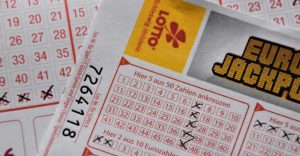 The lottery industry, a longstanding pillar of recreational gambling, is undergoing a significant transformation, thanks to technological advancements and changing player preferences. This evolution has led to the emergence of innovative online lottery games and trends that offer interactive and immersive experiences. These innovations are not just redefining player engagement but are also shaping the future of the lottery industry.
The lottery industry, a longstanding pillar of recreational gambling, is undergoing a significant transformation, thanks to technological advancements and changing player preferences. This evolution has led to the emergence of innovative online lottery games and trends that offer interactive and immersive experiences. These innovations are not just redefining player engagement but are also shaping the future of the lottery industry.
Traditional lotteries, often perceived as straightforward and static, are being revitalized through the integration of interactive and immersive elements of situs togel. These new forms of lottery games leverage technology to create engaging experiences that go beyond the simple purchase of a ticket and waiting for a draw.
- AR and VR: AR and VR technologies are transforming online lottery experiences by creating immersive environments. Players can participate in virtual lottery draws, explore 3D lottery worlds, or use AR to visualize potential winnings in real-life settings.
- Gamification: The incorporation of game-like elements into lottery games has made the experience more engaging and interactive. Features such as missions, achievements, leaderboards, and in-game bonuses keep players engaged and encourage repeat participation.
- Social Lottery Games: The rise of social media has led to the development of social lottery games. These games allow players to buy tickets, share results, and even play in groups with friends or family online, fostering a sense of community and shared excitement.
The Rise of Instant Win Games
Instant win games offer immediate gratification, a key attraction for the modern, fast-paced consumer. They range from simple scratch-off simulations to more complex games with multiple levels and bonus features. The convenience and variety of these games cater to a broader audience, including those who may not be interested in traditional lottery draws.
Cryptocurrency and blockchain technology are making inroads into the lottery industry. Some online lotteries now accept cryptocurrencies like Bitcoin for ticket purchases, appealing to the tech-savvy and privacy-conscious players. Blockchain technology, on the other hand, is being utilized for its transparency and security features, ensuring fair draws and secure transactions.
Customization is a growing trend in the online lottery space. Players can create personalized lottery games, choosing their own numbers, themes, and even prize structures. This level of personalization enhances the player experience, making it more enjoyable and relevant to individual preferences.
Mobile-First Experiences
With the increasing use of smartphones, the lottery industry is adopting a mobile-first approach. Mobile apps offer convenience, allowing players to buy tickets, check results, and receive notifications on the go. These apps often include additional features like ticket scanning, location-based services, and personalized notifications, enhancing the overall user experience.
As the industry evolves, there’s a growing emphasis on ethical and responsible gaming. Innovative online lotteries are incorporating features that promote responsible play, such as setting limits on purchases, self-exclusion options, and access to support for problem gambling.
Looking to the future, artificial intelligence (AI) is poised to play a significant role in the lottery industry. AI can be used for personalization, offering tailored game recommendations and promotions based on individual player behavior and preferences. This level of personalization not only enhances the player experience but also increases engagement and loyalty.
The lottery industry is experiencing a renaissance, driven by innovation and technology. Interactive and immersive experiences, instant win games, the integration of cryptocurrency and blockchain, customizable lotteries, mobile-first approaches, and a focus on ethical and responsible gaming are just some of the trends shaping the future of online lotteries. As these trends continue to evolve, they promise to attract a new generation of players, revitalizing the lottery industry and ensuring its relevance in a rapidly changing digital landscape.
